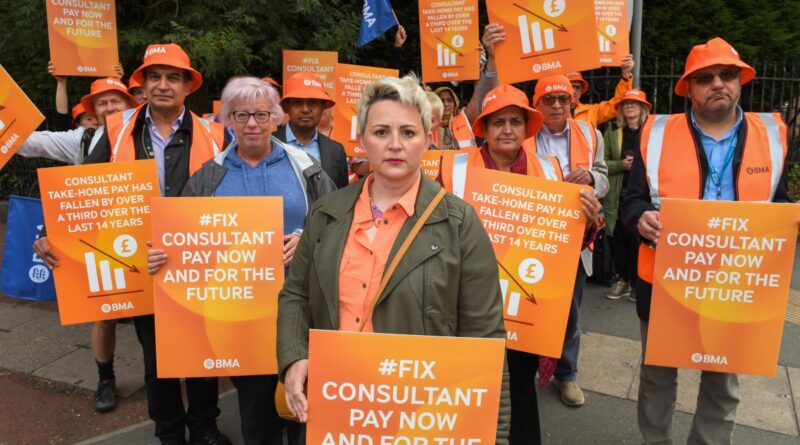Pressure on junior doctors to end strikes
NHS councilors have backed a pay-as-you-go deal that gives relief to patients after a year of strikes and pressure from junior doctors to settle.
Some senior doctors will now receive a pay rise of up to 19 per cent after strongly backing an improved package offered by ministers and calling for an official end to the strike campaign.
The deal has added to the frustration of the government and the NHS that junior doctors are unwilling to talk about accepting any deal short of their demand for a 35% pay rise.
Ministers are now pressuring junior doctors’ leaders to stop “cussing” and start a dialogue. Victoria Atkins, a health writer, wants to start over negotiations after the knife months.
However, some in government and the NHS have given up hope of an end to the strikes before the election, feeling that junior doctors’ leaders are not guaranteed a deal.
Rishi Sunak said the end of the consultant strikes was “good news for patients. It will mean we can continue to make progress towards our goal of reducing waiting lists, which is now in its fourth month in a row .” He described the consultants’ agreement as “fair to them and fair to the taxpayer”.
This week the Prime Minister said it was “disturbing” that junior doctors had rejected a deal worth more than 10 per cent, blaming their strike on a failure to move up the waiting list. Some in the government believe that, unlike the consultants, the BMA’s junior doctors committee is not willing to give up on reaching an agreement.
“This agreement shows that we can reach an agreement when the unions act in good faith,” said a government source. “One of the elements of these discussions was the seriousness and desire to find agreement. Hopefully the junior doctors’ committee will see that and realize that a steady discussion will get better results for the doctors and low patients.”
• Junior doctors’ strikes disrupt appointments for 8,000 children
Matthew Taylor, head of the NHS Association, said health chiefs would “breathe a sigh of relief” at the end of the consultants’ debate, adding that the deal “shows that a reasonable middle ground can be reached through negotiation, and we urge the BMA junior doctors’ committee to re-negotiate as soon as possible to reach a common agreement to stop some of the junior doctors’ strikes”.
Mike Henley, vice-chairman of the BMA’s advisory committee, said the deal “shows that good deals and co-operation with government deals can really be done”.
Others in the NHS are pessimistic, however, with one senior source saying more doctor strikes are “cheap”, saying: “Given the small number of doctors so far, I think it could be elections are likely.” One medical leader said: “Young people have been taken to the top of a very big hill, I’m not sure anyone can see the way down.”
• Hospitals affected by the strike are canceling one in ten appointments
However, Atkins has not given up hope, and after more than three months of bragging about the long-running Christmas season, he recently held “conversations” with junior doctors.
Sir Julian Hartley, chief executive of hospital group NHS Providers, said: “Strikes that are so damaging and costly to the NHS cannot become ‘business as usual’. The remaining challenges must be resolved. Industrial action affects patients, workers and extended services. We urge politicians and unions to find a way to end all disputes.”
The BMA’s advisory committee has approved a pay deal that will cost taxpayers hundreds of millions of pounds after 83 per cent of members voted in favour. The deal will see doctors reach the top of the pay scale five years faster than they currently do, with most increasing immediately to 12.8 percent from the 6 percent already agreed upon.
The BMA rejected a similar deal earlier this year, but has now backed it after ministers got more money to ensure most advisers get a pay rise of around £3,000.
Atkins said he was “delighted that, after many weeks of negotiations, they have accepted this fair and reasonable proposal, ending the threat of another strike action. Councilors will now be able to focus on providing care of high quality to patients and we can consolidate our progress on the waiting list.”
• There is no money on the table for striking doctors, the minister has warned
Vishal Sharma, head of the BMA’s advisory committee, said the negotiations had been “difficult” and described the agreement as a “first step”, warning that strikes could resume if the annual salary review is just started not recommending re-uploading. .
“The fight is not over,” Sharma said. “The advisers have shown that they are not afraid to work when they need it, and the ministers, whether they are current or future, should be aware that we expect to be treated fairly and if the government fails to do that in the future, we will find ourselves there again. in the midst of an industrial dispute.”
#Pressure #junior #doctors #strikes
